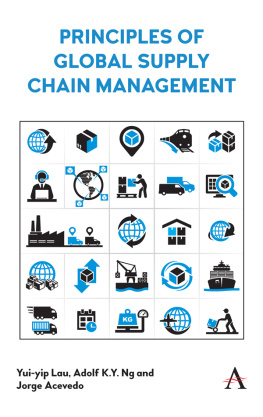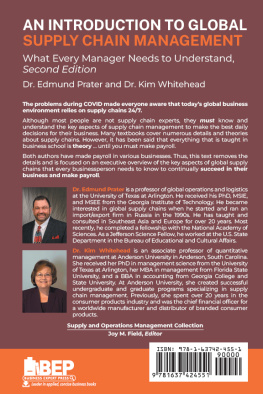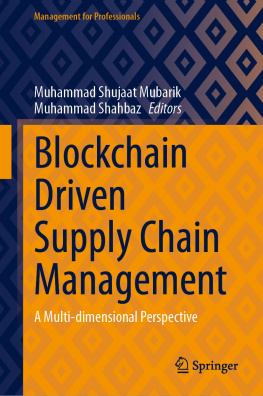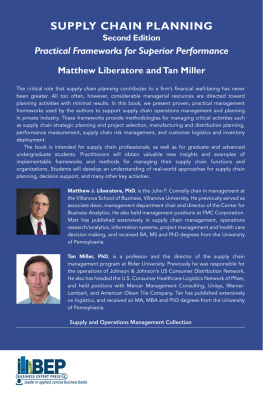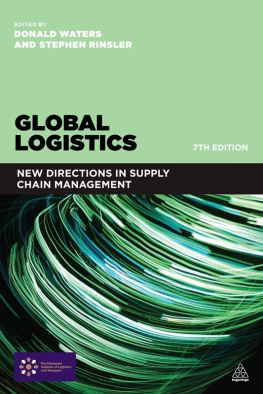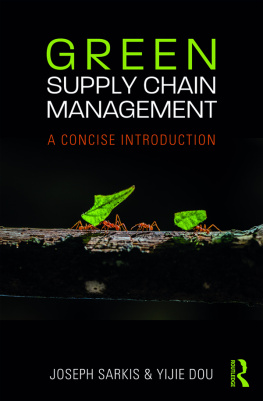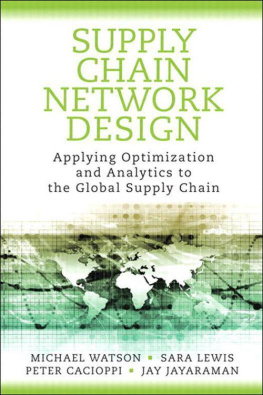Principles of Global Supply Chain Management
Anthem Studies in Supply Chain Management, Maritime Transport and Logistics explores the roles of maritime logistics, shipping and port connectivity, and supply chain system in promoting the globalised economy in tandem with free trade agreements, sustainability, AI and big data. The series touches upon policy, business implications, and contemporary and focal issues with empirical analysis. Titles in this series examine advanced theories, case studies, managerial implications and insights.
Series Editor
Paul Tae-Woo LeeZhejiang University, China
Editorial Board
Prem ChhetriRMIT University, Australia
Kevin CullinaneUniversity of Gothenburg, Sweden
Paul Tae-Woo LeZhejiang University, China
Kevin LiZhejiang University and Editor-in-Chief of Maritime Policy & Management, China
Qiang MengNational University of Singapore, Singapore
Adolf K. Y. NgUniversity of Manitoba, Canada
Theo NotteboomShanghai Maritime University, China
Kamonchanok SuthiwartnaureputChulalongkorn University, Thailand
Koichiro TezukaNippon University, Japan
Grace WangTexas A&M University at Galveston, USA
Zaili YangLiverpool John Moores University, UK
Principles of Global Supply Chain Management
Yui-yip Lau, Adolf K. Y. Ng and Jorge Acevedo Alarid

Anthem Press
An imprint of Wimbledon Publishing Company
www.anthempress.com
This edition first published in UK and USA 2019
by ANTHEM PRESS
7576 Blackfriars Road, London SE1 8HA, UK
or PO Box 9779, London SW19 7ZG, UK
and
244 Madison Ave #116, New York, NY 10016, USA
Yui-yip Lau, Adolf K. Y. Ng and Jorge Acevedo Alarid 2019
The author asserts the moral right to be identified as the author of this work.
All rights reserved. Without limiting the rights under copyright reserved above, no part of this publication may be reproduced, stored or introduced into a retrieval system, or transmitted, in any form or by any means (electronic, mechanical, photocopying, recording or otherwise), without the prior written permission of both the copyright owner and the above publisher of this book.
British Library Cataloguing-in-Publication Data
A catalogue record for this book is available from the British Library.
ISBN-13: 978-1-78308-955-0 (Hbk)
ISBN-10: 1-78308-955-5 (Hbk)
This title is also available as an e-book.
CONTENTS
I agree with the authors that there could be gaps between professional practices and academic knowledge. I am happy that this book, by providing a comprehensive introduction to key functional areas of supply chain management, makes a successful attempt to bridge these gaps. Readers will find the case studies, many of which are drawn from the Asia-Pacific region, relevant and specific. In an era of digitization, supply chain management will undergo rapid changes. Hence, it is even more important now, than ever before, to get the fundamentals right. A solid foundation will empower us to surf successfully on these disruptive tides.
Mr. Sunny Ho (BSocSC, FCILT, FCIM)
Immediate past president, The Chartered Institute of Logistics and Transport in Hong Kong
Executive director, The Hong Kong Shippers Council
Absorb what is useful, discard what is useless and add what is specifically your own.
Knowing is not enough, we must apply. Willing is not enough, we must do.
Bruce Lee, martial artist (194073)
When we were designing and planning for this book, a few quick questions came to our mind: how could we transform new knowledge into practice? How important were infrastructural issues in supply chains? Were there any key research topics that have been seriously neglected in previous books publication? Were active scholars participating in research dedicated to industrial practitioners? Indeed, these are core objectives of applied research that can contribute to academic, industry and community in an ever-changing world.
This book addresses the role of supply chain in the global economy and organizations. Although global supply chain management is critical with different stakeholders within policymakers, students, researchers, logistics associations, participators, even for governmental actors who need to make strategic decisions in sustaining economic competitiveness for their countries and citizens, the core topics are often overlooked. Understanding such deficiency, we strive to include interesting, innovative, and timely topics. The contents may be similar, but different readers may have diversified expectations. Industrial practitioners may look for insight to generate appropriate strategic decisions; students and researchers may look for new ideas to develop new research areas and secure research grants; policymakers may look for best practices that will help them to develop appropriate public policies; logistics associations may look for new knowledge to review their professional training programs that align with international academic/professional standards. Taking three years to complete this book (from writing the proposal to its final publication), we based it on four main principles, namely, clarity (which makes it simple for readers to comprehend), richness (which identifies questions from various academic experiences and disciplines to encourage readers to find out possible unexplored research or key issues), innovations (which stimulates readers to reflect on changing traditional, day-to-day operations for enhancement) and practicality (which equips learners with the skills and knowledge to work in the real world).
This book offers fundamental knowledge with many practical cases that can fulfill the needs and expectations of different parties. Readers can get invaluable insight on the future direction of supply chain development. Moreover, to the best of our knowledge, this is the first book on global supply chains that involves close collaboration between Asian, North American and Latin American scholars and industrial practitionersthe first author has been appointed as an associate by the Transport Institute of the University of Manitoba (2016-18); the second author has been appointed as a visiting scholar in the College of Professional and Continuing Education of the Hong Kong Polytechnic University (2016); and the third author has been invited to visit the Hong Kong Community College of the Hong Kong Polytechnic University as an expert consultant in holistic logistical infrastructures and industrial development topics (2016). The knowledge exchange and collaborative activities have surely contributed to new opportunities in exploring new areas of interdisciplinary research, conducting sophisticated investigations to enhance credentials, and professionalization.
The completion of this book has been achieved via important support that we would like to acknowledge. First, this project is supported by the Insight Grant (project no. 47360 and sponsor award no. 435-2017-0735) of the Social Science and Humanities Research Council of Canada (SSHRC). Second, we would like to acknowledge the College of Professional and Continuing Education of the Hong Kong Polytechnic University via Visiting Scholar Program which catalyzed the development of this collaboration. Third, we acknowledge the publisher, Anthem Press, for offering us such a worthwhile opportunity. Fourth, we would like to thank Yantian International Container Terminals, Huayang (Hong Kong) Shipping Ltd, Helmsman Supply Ltd, government of Guanajuato, and Nuevo Laredo for their support, sharing of information and successful experiences, and contributing useful photos to this book. On a more personal note, the first author wants to thank his wife Tracys continuous, unconditional support of his vision of an academic career path. Also, he wants to thank his friends, colleagues, students and doctoral classmates for their encouragement. The second author wants to thank his familys continuous, unconditional support as he pursues an academic career. The third author wants to thank his wife (Maria), kids (Jorge Andres and Alejandro), family and colleagues for always pushing and inspiring him to develop a better world. Last but not the least, we want to thank our readers, who have decided to use it for studying, research, and professional training purposes. We hope that they enjoy reading it and appreciate what we have tried to achieve.

